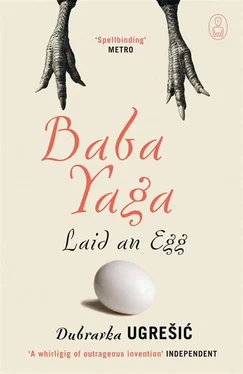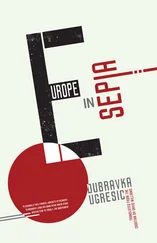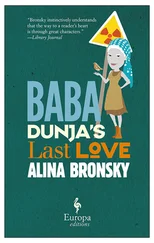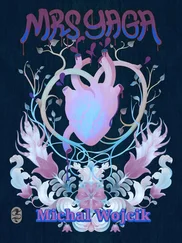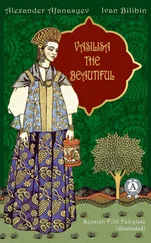‘So why don’t you intervene?’ asked Arnoš.
‘How could I intervene?’
‘Well, for instance, you could go back to your hotel room and confront the new circumstance in your life, your little granddaughter! And then endeavour to make the very best you can of the situation.’
‘How?!’
‘You’ll know, when it comes to it.’
Perhaps Arnoš was right about this as well. Perhaps intervening in the screenplay is all that is left to us? To offer our shoulder at the right moment for someone to cry on, to hand someone a handkerchief, show them the way. Because people often do not know the most basic things. Once Beba was waiting in a queue at the bank when a man asked her: ‘Excuse me, which is the right-hand side here?’ Everyone who heard him burst out laughing. It was only Beba who felt sympathy for the confused man. Showing someone which is right and which left, that is perhaps the intervention Arnoš means. We cannot do more than that, even if we wanted to. Take Pupa. Ever since she had known her, Pupa had always been reticent and restrained. If she ever said anything it was usually a comment on what others were saying. Beba had always thought that tiny little woman was as strong as an oak. Now she recalled a distant scene which she had forgotten. She had once gone to see Pupa, her door was open, and she had gone in and found Pupa kneeling on the floor, sobbing. It was a chilling scene, and Beba had wanted to tiptoe out again, to simply run away from the place of someone else’s misery. That was when she realised for the first time that we are capable of swallowing all sorts of things. After all, she had herself had her fill in hospital – of stomachs split open and guts falling out – and all that could be borne; there was only one thing that it was very hard to accept: the sight of someone else’s pain, a glimpse of a soul seeping unstoppably out of a body like a stream of urine. In the face of such a sight, we are hypnotised, like a rabbit confronting a boa constrictor. Beba sat down on the floor, without a word, spread her legs, placed Pupa in her lap, clasping her with both her arms and legs, pressing her to herself like a cushion, and who knows how long the two of them sat there like that in silence, fitted one into the other like two spoons. They never mentioned it afterwards, Beba did not ask, and Pupa never told her what it was about. Perhaps it had not been anything special. Perhaps some inner sorrow had risen up in her and stuck in her throat like a fish bone. Beba had helped her cough it out. And that was all. As we grow older, we weep less and less. It takes energy to weep. In old age neither the lungs, nor the heart, nor the tear ducts, nor the muscles have the strength for great misery. Age is a kind of natural sedative, perhaps because age itself is a misfortune.
‘How will I know? I was a lousy mother. I’ve wasted my own life pointlessly. I’m not qualified to be a grandmother,’ said Beba.
‘Just take a look around you, see how many people have placed their stakes on you!’
‘How do you mean?’
‘Your son, for example, he placed his stake on you! And the dice went in your favour! And your late friend, she too gave you a chance. And I, talking to you now, I am placing my stake on you. Admittedly it’s only a small coin, but I’ve placed it on you, and not on anyone else.’
‘You’re a good man, Arnoš.’
‘Perhaps, but I was a bad husband, father and grandfather. All I cared about in my life were women. I’m nothing but a scatterbrain, my dear. But still I’m lucky. There are few people my age who can afford such luxury.’
‘I don’t know. I’m seventy years old; I haven’t learned anything sensible in my life. Sometimes I think it would be best to kill myself…’ mused Beba thoughtfully.
Arnoš looked at her and said cheerfully:
If you want to end it all, do it with good taste:
You would not wish to leave a pall or a bitter taste.
Choose with care, as though it were a matter of fine wine:
Leave those who stay here with a sense of touching the divine.
If you want to end it all, do it with good taste:
Let others know you had a ball, your life was not a waste.
Choose a plaited rope of silk, in the hour before dawn,
When the air is smooth as milk and dew bejewels the lawn.
If you want to end it all, do it with good taste:
Find a sparkling waterfall, its spray spun and laced,
Scatter it with flowers whose fragrance lasts for hours,
Take something sweet to sustain you through the moment’s heat,
Breathe in and dive arrow-like, in your most graceful style
Straight as a die through the narrow gate, wearing a blissful smile.
‘Who wrote that?’
‘I did. I’ve written quite a pile of worthless verses. And so as not to fall into the temptation of reciting any more, let’s clink our glasses and drink to a good night and a forthcoming bright, sunny morning!’ said Arnoš Kozeny in high spirits.
And us? While life stumbles through thickets and briars, the tale is one of the constant high-fliers.
The young man and the girl were sitting on a bench in the local park under a large chestnut tree whose luxuriant branches shrouded them like a green crown. The grass around them was moist and soft. It looked like a field prepared for an unusual ritual whose pagan signs no one was capable of deciphering. The local birds were changing their plumage and leaving their feathers everywhere. From a distance, it looked as though the young couple on the bench were protected by a feathery net, a large Indian ‘castle of dreams’. The birds hidden in the thick branches of the chestnut hushed their song to listen to the human chirruping.
‘You’re my pudding, my fruit pudding…’
The girl listened breathlessly, but her gaze was directed somewhere towards her feet, where from time to time she scratched one foot with the other.
‘You’re my peach melba, my cream alpine, my blueberry anglaise, my floating island, my chocolate éclair, my choux chantilly, my kirsch bûchette… you’re my kirsch puff.’
‘What?’ the girl laughed delightedly.
‘You’re my croque-en-bouche, my brioche, my brioche au sucre, my almond cookie, my rum baba, my biscuit, my biscuit de savoie, my profiterole,’ whispered Mevlo into the girl’s ear, which was pink as orange rind.
‘Ah, Mellow…’ whispered the girl, trembling from the intoxicating shivers running through her round body.
‘Mevlo…’ Mevlo corrected her.
‘Mellow…’ repeated the girl, looking at Mevlo with wide-open eyes.
‘My name is Mevlo…’ repeated Mevlo, plunging into those two green pools.
‘Mellow…’ said the girl sweetly.
‘ OK , mala moja, vidim da mi to néceš naučit…’ [8] ‘OK, little one, I see that you’re never going to learn.’
Mevlo sighed resignedly.
Mevlo had taken a menu from the hotel confectioner’s and spent the whole night learning the names of cakes and sweets. That was the cleverest piece of advice that anyone could have given him. And it was advice given him by Arnoš Kozeny.
‘My dear young man,’ Arnoš Kozeny had said, when Mevlo complained in despair that he could not speak English and that he did not know how he could explain to the girl that he cared about her, ‘the fact that you don’t speak English is to your advantage. Because if you could, you might make a mistake. Whereas this way it’s quite immaterial what you say, chemical formulae or car parts. In any case in the first phase of being in love couples don’t talk. They chirrup…’
‘Like birds?’
‘Like birds, my boy…’ said Arnoš Kozeny, adding enigmatically: ‘Not only do they chirrup, but feathers fly in all directions.’
Читать дальше
